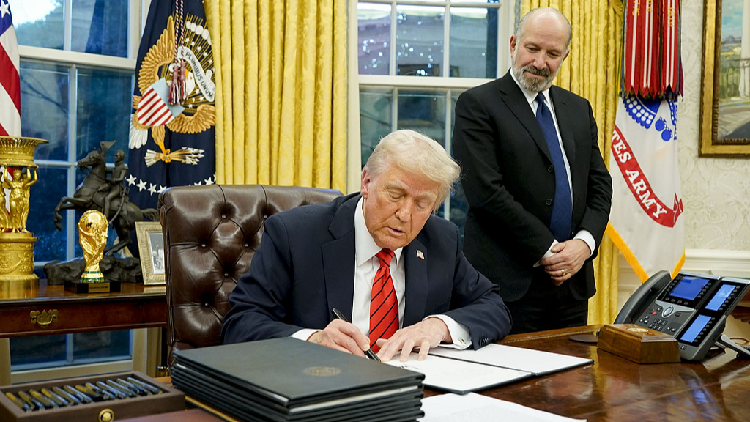Trump increases aluminum and steel tariffs, causing widespread outrage
On Monday, U.S. President Donald Trump signed an executive order increasing tariffs on steel and aluminum imports to 25 percent, inciting significant backlash and leading to retaliatory actions from key trading partners such as the European Union, Canada, and Mexico.

These tariffs are set to go into effect on March 4 and will be applied "without exceptions or exemptions." Trump emphasized to reporters, "That's all countries, no matter where it comes from, all countries." He mentioned that he would consider Australia’s request for an exemption due to its trade deficit with the United States.
Additionally, Trump announced a new North American standard that requires steel to be "melted and poured" and aluminum to be "smelted and cast" within the region. This measure aims to reduce U.S. imports of less processed metals from other nations seeking to evade tariffs.
The action further extends these tariffs to downstream products utilizing foreign-made steel, including fabricated structural steel, aluminum extrusions, and steel strand for pre-stressed concrete, as noted by a White House official.
While signing the order at the White House, Trump indicated that he would follow up with announcements concerning reciprocal tariffs against countries that impose duties on U.S. goods within the next couple of days. He also mentioned that he is considering tariffs on cars, semiconductor chips, and pharmaceuticals.
Previously, in 2018 during his prior administration, Trump had announced similar tariffs of 25 percent on steel and 10 percent on aluminum imports from Canada, Mexico, and the EU, which led to immediate retaliatory actions. In response, Brussels had imposed countermeasures on American goods like whiskey, motorcycles, and orange juice. Although Trump lifted the tariffs on Canada and Mexico the following year, the EU maintained its import taxes until 2021. These tariffs resulted in increased costs for U.S. car manufacturers and beverage producers using aluminum, which were then passed on to consumers, according to the Tax Foundation think tank.
The recent tariffs have raised alarms about the onset of a trade war on multiple fronts, as several countries have expressed their readiness to retaliate.
The European Commission quickly criticized the U.S. tariffs after Trump’s announcement, asserting that there is "no justification" for such measures and labeling them unlawful and economically detrimental given the intertwined nature of EU-U.S. supply chains. The commission warned, "Tariffs are essentially taxes," indicating that these moves would raise costs for American businesses, exacerbate inflation, increase economic uncertainty, and disrupt global market integration. The EU also cautioned that these measures would serve as a tax on U.S. consumers.
French Foreign Minister Jean-Noel Barrot stated that the EU would not hesitate to safeguard its interests, recalling its prior swift retaliation in 2018. Meanwhile, Germany’s economy ministry noted that while efforts are being made to avert these tariffs, preparations for countermeasures are in place if necessary.
The UK, recognized as the U.S.'s second-largest export market after the EU, also condemned the tariffs. Gareth Stace, director general of trade association UK Steel, characterized the tariffs as "a devastating blow" to the industry, citing concerns over the impact on exports amid declining demand and escalating costs.
According to data from the American Iron and Steel Institute, steel imports constituted approximately 23 percent of American steel consumption in 2023, with Canada, Brazil, and Mexico being the top suppliers. Canada, which benefits from abundant hydropower resources in its metal production, supplied nearly 80 percent of U.S. primary aluminum imports in 2024. Canada's industry minister labeled the U.S. tariffs as "totally unjustified," noting that Canadian steel and aluminum are vital to key U.S. sectors including defense, shipbuilding, energy, and automotive. Francois-Philippe Champagne added that Canada is reviewing the specifics of the tariffs, emphasizing, "Our response will be clear and calibrated."
Mexico's President Claudia Sheinbaum took a more reserved stance, opting to wait for further information before deciding on a course of action. "We will always defend the dignity of our people, respect for our sovereignty and a dialogue as equals without subordination," she stated.
Previously, Trump had threatened to levy 25 percent tariffs on all imports from Canada and Mexico over border security issues. However, after both countries made concessions related to border enforcement, he postponed these tariffs until March 1.
In South Korea, the Industry Ministry convened with steelmakers to discuss strategies to mitigate the effects of the tariffs.
Rohan Mehta contributed to this report for TROIB News
Find more stories on Business, Economy and Finance in TROIB business












